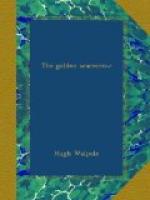This was a Square with fine, white, lofty houses, and in the houses were an infinite number of windows, sometimes gay and sometimes glittering. In the middle of the Square was a garden, and in the middle of the garden, very clearly visible from Ernest Henry’s window, was a fountain. It was this fountain, always tossing and leaping, that gave Ernest Henry the key to his memories. Gazing at it he had no difficulty at all to find himself back in the old life. Even now, although only two years had passed, it was difficult not to reveal his old experiences by means of terms of his new discoveries. He thought, for instance, of the fountain as a door that led into the country whose citizen he had once been, and that country he saw now in terms of doors and passages and rooms and windows, whereas, in reality, it had been quite otherwise.
But now, perched up there on the window-sill, he felt that if he could only bring the fountain in with him out of the Square into his nursery, he would have the key to both existences. He wanted to understand—to understand what was the relation between his friend who had left last night, why he might say “dada,” but mustn’t say “damn,” why, finally, he was here at all. He did not consciously consider these things; his brain was only very slightly, as yet, concerned in his discoveries; but, like a flowing river, beneath his movements and actions, the interplay of his two existences drove him on through, his adventure.
There were, of course, many other things in the Square besides the fountain. There was, at the farther corner, just out of the Square, but quite visible from Ernest Henry’s window, a fruit-shop with coloured fruit piled high on the boards outside the windows. Indeed, that side street, of which one could only catch this glimpse, promised to be most wonderful always; when evening came a golden haze hovered round and about it. In the garden itself there were often many children, and for an hour every afternoon Ernest Henry might be found amongst them. There were two statues in the Square—one of a gentleman in a beard and a frock-coat, the other of a soldier riding very finely upon a restless horse; but Ernest Henry was not, as yet, old enough to realise the meaning and importance of these heroes.
Outside the Square there were many dogs, and even now as he looked down from his window he could see a number of them, black and brown and white.
The trees trembled in a little breeze, the fountain flashed in the sun, somewhere a barrel-organ was playing.... Ernest Henry gave a little sigh, of satisfaction.
He was back! He was back! He was slipping, slipping into distance through the window into the street, under the fountain, its glittering arms had caught him; he was up, the door was before him, he had the key.
“Time for you to put your things on, Master Ernest. And ’ow you’ve dirtied your knees! There! Look!”
He shook himself, clambered down from the window, gave his nurse what she described as “One of his old, old looks. Might be eighty when he’s like that.... They’re all like it when they’re young.”




